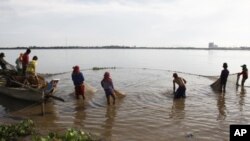Government officials say any delay on the construction of a hydropower dam on the Sesan river in Stung Treng province is unlikely, even though residents along the river say they want more impact studies conducted.
Prach Sun, secretary of state for the Ministry of Environment, told VOA Khmer the government has already conducted an impact study, but that it would still deal with river communities on the issue of compensation.
Last month, representatives of communities living on the Sesan in Ratanakkiri province, 40 kilometers from the proposed dam site, appealed to the government to delay construction of the dam, saying they were concerned about their livelihoods and the amounts of resettlement packages.
However, the project, a joint venture between Vietnamese company EVN International and Cambodia’s Royal Group, has already been approved, with construction expected to begin later this year or early in 2012.
That would force more than 1,500 families to resettle, according to reports by the 3S Rivers Protection Network. But even more could be affected in other ways.
The Rivers Coalition in Cambodia reported in 2009 that at least 38,000 people in 90 villages, including a large number of ethnic minorities, could lose fish resources, as the dam would block migration between the Mekong river and the Sekong, Sesan and Srey Pok tributaries.
“At our downstream community, the company did not come down to do any studies on the dam’s impacts,” Phat Sunith, chief of Kampun commune in Sesan district, told VOA Khmer. “They did come ask our people what we do for a living, so we received no information.”
Tek Vannara, program manager for the Culture and Environment Preservation Association, a member of the Rivers Coalition, said resettlement plans are “crucial” for communities that will be affected by the dam.
“If they know the information clearly, they can make clear decisions as to whether they should build their houses, get their children married or farm on their land,” he said.
Representatives of both companies have been tight-lipped so far on the proposed dam’s construction.
However, Danh Serey, deputy director of the environmental impact assessment department of the Ministry of Environment, said the companies had followed all the requirements set by the ministry when they conducted their impact studies.
He said Cambodia needs energy to boost its economy. The electricity generated at the Lower Sesan 2 would supply the provinces of Ratankkiri and Mondolkiri before it is transmitted to Vietnam, he said.




